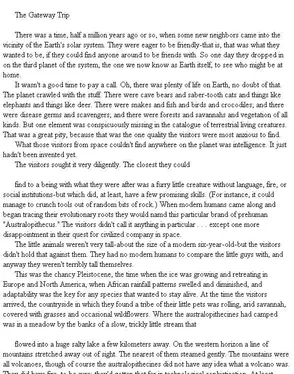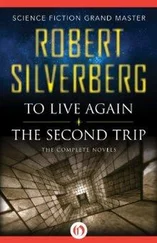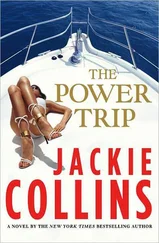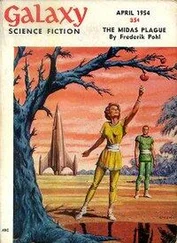Pohl, Frederik - The Gateway Trip
Здесь есть возможность читать онлайн «Pohl, Frederik - The Gateway Trip» весь текст электронной книги совершенно бесплатно (целиком полную версию без сокращений). В некоторых случаях можно слушать аудио, скачать через торрент в формате fb2 и присутствует краткое содержание. Жанр: Старинная литература, на английском языке. Описание произведения, (предисловие) а так же отзывы посетителей доступны на портале библиотеки ЛибКат.
- Название:The Gateway Trip
- Автор:
- Жанр:
- Год:неизвестен
- ISBN:нет данных
- Рейтинг книги:4 / 5. Голосов: 1
-
Избранное:Добавить в избранное
- Отзывы:
-
Ваша оценка:
- 80
- 1
- 2
- 3
- 4
- 5
The Gateway Trip: краткое содержание, описание и аннотация
Предлагаем к чтению аннотацию, описание, краткое содержание или предисловие (зависит от того, что написал сам автор книги «The Gateway Trip»). Если вы не нашли необходимую информацию о книге — напишите в комментариях, мы постараемся отыскать её.
The Gateway Trip — читать онлайн бесплатно полную книгу (весь текст) целиком
Ниже представлен текст книги, разбитый по страницам. Система сохранения места последней прочитанной страницы, позволяет с удобством читать онлайн бесплатно книгу «The Gateway Trip», без необходимости каждый раз заново искать на чём Вы остановились. Поставьте закладку, и сможете в любой момент перейти на страницу, на которой закончили чтение.
Интервал:
Закладка:
But they also saw that the asteroid was empty. There were no ships. There were no artifacts at all. It was riddled with tunnels, just like Gateway, but the tunnels were vacant. Worse than that, the whole asteroid seemed in very bad shape, as though it were far older, and had had a far harder life, than Gateway itself.
That puzzle cleared itself up when, with the last of their resources, two of the crew ventured down to the planet itself.
It had been a living planet once. It had life now, in fact, but in scant numbers and only in its seas-algae and sea-bottom invertebrates, nothing more. Somehow or other the planet had been seared and ravaged ... and the culprit was in view.
Six and a half light-years away from that system they discovered a neutron star. Like most neutron stars, it was a pulsar, but as their ship was nowhere near its axis of radiation they could hardly detect its jets. But it was a radio source, and their instruments showed that it was there, the remnant of a supernova.
The rest of the story the experts on Gateway filled in for them when they returned. That solar system had been visited by the Heechee, but it was in a bad neighborhood. After the Heechee left-probably knowing what was about to happen-the supernova exploded. The planet had been baked. Its gases had been driven off, and most of its seas boiled away. As the hellish heat died away a thin new atmosphere was cooked out of the planet's crust, and the
remaining water vapor had come down in incredible torrents of rain, scouring away mountain valleys, burying plains in silt, leaving nothing... and all of that had happened hundreds of thousands of years before.
Monsanto, Running Wolf, and Pursy got a science bonus for their mission-a small one, a hundred and sixty thousand dollars to be divided among the three of them.
By Gateway standards, that wasn't serious money. It was enough to pay their bills on Gateway for a few extra weeks. It was not nearly enough to retire on. All three of them shipped out again as soon as they found another berth, and from their next voyage none of them ever returned.
Probably the Gateway prospectors should have taken it for granted that hospitable, Earth-like planets were bound to be a lot rarer than malignant ones. Their own solar system made that much clear. Anyway, all those years of listening to Project Ozma radio signals should have taught them that much.
What they found out was that there was a myriad different kinds of hostile environments. There was Eta Carina Seven; it was the right size, it had air, it even had water-when it wasn't frozen, anyway. But Eta Carina Seven had a highly eccentric orbit. It was pretty well iced over, though still on its way to its frigid aphelion, and there were terrible storms. One lander never came back at all. Three of the others were damaged, or lost at least one crew member.
Mendoza was not the only one to find a planet that looked nice but turned out to be poison. One pleasing-looking planet was well vegetated, but the vegetation was all toxicodendrons. They were far worse than Earth's poison ivy. The slightest touch meant blisters, agonizing itching pain, and anaphylactic shock. On the first mission to it everyone who landed on its surface died of allergic reactions, and only the crew member who stayed with the ship in orbit was able to get back to Gateway.
But once in a while-oh, very seldom-there was a good one.
The happiest of all, in the first decade of Gateway's operation, was the mission of Margaret Brisch, usually called "Peggy."
Peggy Brisch went out in a One. She found what was really another Earth. In fact, in some ways it was nicer than Earth ever was. Not only were there no toxicodendrons to kill anyone who touched, or any nearby star with lethal radiation, there were not even any large, dangerous animals.
There was only one thing wrong with Peggy's Planet. It would have been an ideal place to take Earth's overflow population, if only it hadn't been located a good nineteen hundred light-years away.
There was no way to get to it except on a Heechee ship. And the largest Heechee ship carried only five people.
The colonization of Peggy's Planet would have to wait.
First and last, the Gateway prospectors found more than two hundred planets with significant life. It drove the taxonomists happily crazy. Generations of doctoral candidates had dissertation material that could not fail to win their degrees, and hard work simply to find names for the thirty or forty million new species the prospectors found for them.
They didn't have that many names to spare, of course. The best they could do was assign classification numbers and note the descriptions. There was no hope of establishing genera or even families, although all the descriptions were fed into the databanks and a lot of computer time went into trying to discover relationships. The best descriptions were generic; DNA, or something like it, was pretty nearly universal. The next best were morphological. Most living things on Earth share such common architectural features as the rod (indispensable for limbs and bones in general) and the cylinder (internal organs, torsos, and so on), because they provide the most strength and carrying capacity you can get for the money. For the same reasons, so did most of the galaxy's bestiary. Not always,
though. Arcangelo Pelieri's crew found a mute world, full of soft-bodied things that had never developed bones or chitin, soundless as earthworms or jellyfish. Opal Cudwallader reached a planet where, the scientists deduced, repeated extinctions had kept knocking off land animals as they developed. Its principal creature, like Earthly pinnipeds and cetaceans, was a former land-dweller returned to the sea, and nearly everything else was related. It was as though Darwin's finches had colonized an entire planet.
And so on and so on, until the explorers began to think they had found every possible variation on water-based, oxygen-breathing life.
Perhaps they almost had.
But then they found the Sluggards-the same race the Heechee had known as the Slow Swimmers-and took another look at the hitherto unimagined possible flora and fauna of the gas giants.
So they had been wrong in their basic assumption that life required the chemistry of a solid planet to evolve. That was a shock to their scientists . . . but not nearly the shock that came a bit later, when they discovered that life didn't require chemistry at all.
Planets were nice, and pictures of stars were nice, but what everyone really wanted were some more samples of Heechee technology. There wasn't any doubt that there was some of the stuff waiting to be found-somewhere. The ships proved that. The little morsels picked up in the tunnels of Venus had proved it even earlier. But they just whetted the human appetite for more of these wonders.
Fourteen months after the program officially started, a mission got lucky.
Their ship was what was generally called a Five, but the system had not yet begun to operate in a standardized way. This time only four volunteers went along. They were officially chosen by the four Earth powers that had established the Gateway Corporation (the Martians took an interest later), and so they were an American, a Chinese, a Soviet, and a Brazilian. They had learned from the experience of Colonel Kaplan and others who had gone before. They brought along enough food, water, and oxygen to last them for six months; they were taking no chances this time.
As it happened, they didn't need all those provisions. Their ship
brought them back in forty-nine days, and they didn't come back empty-handed.
Their destination had turned out to be an orbit around a planet about the size of the Earth. They had managed to make the lander work, and three of them had actually used it to set foot on the surface of the planet.
Читать дальшеИнтервал:
Закладка:
Похожие книги на «The Gateway Trip»
Представляем Вашему вниманию похожие книги на «The Gateway Trip» списком для выбора. Мы отобрали схожую по названию и смыслу литературу в надежде предоставить читателям больше вариантов отыскать новые, интересные, ещё непрочитанные произведения.
Обсуждение, отзывы о книге «The Gateway Trip» и просто собственные мнения читателей. Оставьте ваши комментарии, напишите, что Вы думаете о произведении, его смысле или главных героях. Укажите что конкретно понравилось, а что нет, и почему Вы так считаете.












